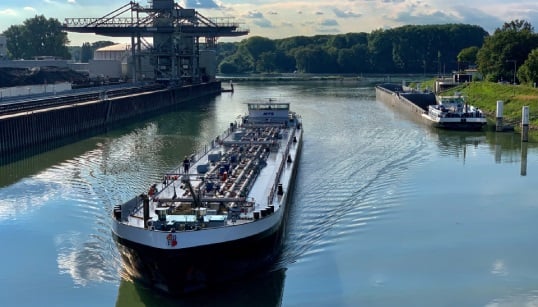
The Netherlands and five other countries are signatories to a treaty to end degassing from inland tankers, with phase two coming into force this July.what does it entail?
Degassing refers to ventilating enclosed spaces to remove harmful gases. In inland navigation, it is specifically about removing liquid residual cargo from the cargo tanks of tankers. After a cargo is unloaded, a residual cargo is often left behind, and ships degas this residue on the way to reload by evaporating it with fans and blowing it out of the tanks and pipes. The tanks must then be cleaned.
The CDNI Convention
The Netherlands is one of six countries that have now laid down in a treaty what must be done with waste materials, including residual cargo. This treaty is known by its French abbreviation, CDNI: Convention relative à la collecte, au dépôt et à la reception des déchets survenant en navigation rhénane et intérieure. In the Netherlands, this convention is incorporated in the Shipping Waste Decree. This convention covers:
● waste containing oil and grease
● cargo waste
● other ship-generated waste, such as household waste and small hazardous waste
Among other things, the CDNI Convention regulates a gradual ban on degassing. Vapours will no longer be released into the air, but at special facilities.
Degassing ban for inland waterways The Netherlands and five other countries are signatories to a treaty to end degassing from inland tankers, with phase two coming into force this July.
A gradual ban
The ban on degassing while underway will take effect six months after the last country concerned incorporates the ban into its national legislation. It will occur in three stages:
Phase 1: ban on degassing petrol, benzene, petroleum distillates and mixtures containing more than 10% ethanol
Phase 2 (two years later): ban on degassing crude oil,flammable liquids and hydrocarbons with more than 10% benzene
Phase 3 (four years after phase 1): ban on degassing of acetone, ethanol and methanol and other substances.
Shortage of facilities
A problem with the ban is the shortage of release points. Currently, only two facilities are available in the Netherlands, which is insufficient, especially given the extensive operational area of tankers. Without sufficient drop-off points, vessels risk being immobilised.
The Union's position
Nautilus supports the ban partly because it will reduce the exposure of those living near where the ships pass to harmful substances, but especially because it will protect crew onboard.
However, Nautilus is also calling for a solution when ships are unable to comply with the ban. When problems arise, the Union doesn’t want fingers to be pointed at the skipper because of a situation they cannot resolve.
Nautilus always stands up against unjust criminalisation of maritime professionals, including in this situation
Tags
